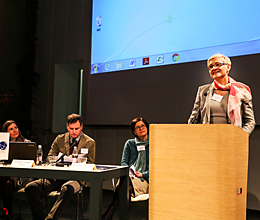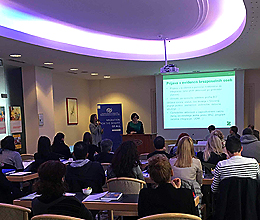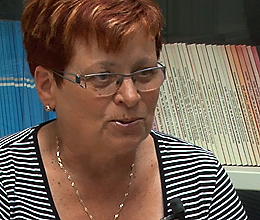|
|
| |
 |
|
After undergoing profound political transformations, the Danube region is now facing diverse demographic, labour market and migration challenges, yet it lacks appropriate multi-level governance support structures, especially regards of migrants' integration. The consortium of partners from nine countries (Slovenia, Croatia, Serbia, Bosnia and Herzegovina, Austria, Germany, Slovak Republic, Czech Republic and Hungary) will address this challenge by creating the comprehensive, multilingual and transnational information platform DANUBE COMPASS. This tool will be mainstreamed to all levels of public institutions as well as promoted through a strategy addressing the importance of migrants' access to integration as a corner stone of a modern integration approach in the Danube region. The main result of DRIM - the improved capacity of public institutions to respond to the needs of newly arrived as well as resident migrants through effective information sharing - will be a corner stone of an information infrastructure that will facilitate economic integration in the Danube region.
Project Fact Sheet:
- Start date: 01. January 2017
- End date: 30. June 2019
- Overall budget: 1.522.169,3 EUR
- ERDF Contribution: 1.207.660,69 EUR
- IPA Contribution: 86.183,2 EUR
- Priority: A well-governed Danube region
dtp.interreg-danube.eu/approved-projects/drim
|
| |
|
| |
 |
DRIM KICK-OFF EVENT IN LJUBLJANA
|
| |
 |
|
The first important public event of the DRIM project was the kick-off meeting, which took place between 6 and 7 February 2017 in Ljubljana, hosted by The Research Centre of the Slovenian Academy of Sciences and Arts (ZRC SAZU). The participants to the meeting talked about upcoming activities, the first of them being a common Danube region transnational information platform for economic integration of migrants. The speakers at the kick-off conference were DRIM project leader dr. Martina Bofulin, a representative of the Danube Transnational Programme Johannes Gabriel, internet activist and artist Vuk Ćosić, and a representative of Ljubljana’s Counselling office for workers Goran Lukić.
Read more…
|
|
| |
 |
WHO ARE WE? - PRESENTATION OF THE DRIM PARTNERSHIP
|
| |
|

The DRIM project involves 18 multisector partners from 9 Danube region countries. The selected territories represent various profiles of the upper Danube region as concerns migration processes. The partnership consists of the following organizations: The Research Centre of the Slovenian Academy of Sciences and Arts, Caritas Academy of Diocese Graz-Seckau, SPF Group, Ltd., GS gain&sustain OG, Employment Service of Slovenia, Centre for Peace Studies, Institute of Ethnology, Slovak Academy of Sciences, Central Transdanubian Regional Innovation Agency and the City of Munich, Department of Labour and Economic Development, Local Employment and Qualification Policy, Lawyers Committee for Human Rights, Office for Human Rights and Rights of National Minorities, Government of the Republic of Croatia, Department of Integration of the City of Graz, Commissioner for the Protection of Equality of the Republic of Serbia, The Municipal Authority of Prague-Libuš, META, o.p.s. – Association for Opportunities of Young Migrants, Ministry of Labour, Family, Social Affairs and Equal Opportunities, Institute for Labour and Family Research, and Agency for Labour and Employment of Bosnia and Herzegovina. All partners have an extensive track record of working on migration or broader social cohesion. With their rich and versatile experience each partner plays a significant role for the project’s successful implementation.
Read more…
|
|
| |
 |
THE DTP CAPITALIZATION STRATEGY – WHAT IS THAT?
|
| |
 |
|
The Danube Cooperation Programme Capitalization Strategy’s aim is to support the capitalization of previous projects' outputs and further build upon the knowledge gained in the same field and to increase the visibility and impact of individual projects by linking actors with complementary approaches and activities. In the field of migration and inclusive governance three projects approved at the DTP 1st call were identified to address similar issues and have common goals, thus enabling the formation of shared capitalization agenda and activities: DRIM, RARE and YOUMIG.
Read more…
|
|
| |
 |
DRIM – THE INTERVIEW WITH MAJDA HOSTNIK, A FORMER LEADER OF THE INFOPOINT FOR FOREIGNERS PROJECT
|
| |
 |
|
The idea behind DRIM stems from previous cooperation between Research Centre of the Slovenian Academy of Sciences and Arts (ZRC SAZU) and the Employment Service of Slovenia (ZRSZ) on the project Infopoint for Foreigners. They created a short version of an information platform, a catalogue of educational programmes, measures and other services for migrants and their family members in order to improve their integration in the Slovenian labour market. Majda Hostnik, a former leader of the Infopoint for Foreigners project, talked about the meaning of the access to information for migrants in the new environment. She introduced effects and some activities of their past project that DRIM is trying to pursue and upgrade.
Read more…
|
|
| |
 |
DRIM’S AIMS AND ACTIVITIES BEING PRESENTED AT DIFFERENT EVENTS
|
| |
 |
|
Since the beginning of the project in January 2017 DRIM has been presented at various occasions and events in different countries. A project partner YUCOM representative talked about the activities of DRIM at the event in New York, USA. Presentation of DRIM’s aims and activities was also made in two Slovenian cities. At the IOM roundtable in Ljubljana the presentation was made by a representative from the Employment Service of Slovenia. The DRIM project manager from The Research Centre of the Slovenian Academy of Sciences and Arts (ZRC SAZU) participated at the roundtable organized in Maribor by the YOUMIG participating partner in Slovenia, the Maribor Development Agency.
Read more…
|
|
|
|
|
| |
|
If you have received this newsletter, you have been included on one or more of the Danube Transnational Programme/projects postal mailing lists. We are committed to respect and protect the privacy of personal data collected. We regard your personal data as confidential information and will never communicate it to third parties. Your personal data are used mainly for the express purpose of receiving the newsletter. Your mailing details may also be used by the DTP and its projects for information and dissemination purposes strictly related to the programme and its projects. If you prefer not to receive more of this newsletter and your data not to be used for dissemination purposes, you can unsubscribe by sending a reply email.
|
|
|
|
|
|
